Inaugural Eviction Data Response Network Convening Highlights Tenacity of State and Local Champions
Blog Post
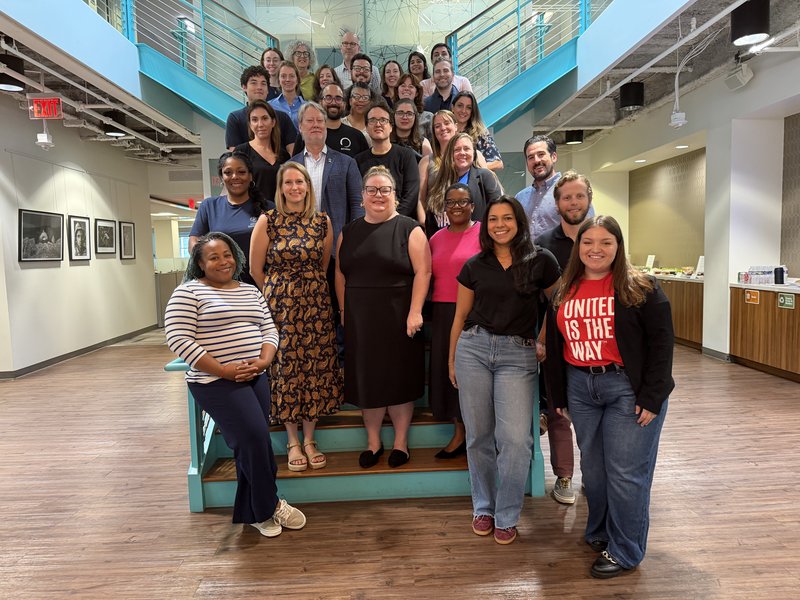
Emily Winchester/New America
Oct. 10, 2025
Each year, millions of Americans are evicted from their homes—disproportionately Black and Latino households, and families with young children. Yet most local leaders don’t know basic information about evictions in their communities, because data on evictions is often incomplete, inaccurate, or inaccessible.
Over the last year, New America’s Future of Land and Housing program (FLH) partnered with communities across the U.S. to change that reality. Our Eviction Data Response Network (EDRN) brought together nine city-, county-, and state-level partners to develop detailed understanding of their local eviction data, and use insights to accelerate housing justice for renters in their communities. These partners hail from the university, nonprofit, and government sectors, and often undertook this daunting work on top of their busy roles counseling renters, administering grants, and implementing housing policies and programs.
EDRN partners (highlighted in the map below) worked to collect data from state and local courts, analyze it for eviction trends and hotspots, and convene diverse stakeholders to share their findings and brainstorm how to move the needle on eviction prevention. From building trust and establishing relationships with court clerks in Indiana to developing code in order to collect data from court dockets in Ohio, partners’ work through EDRN varied based on their goals and data access environments.
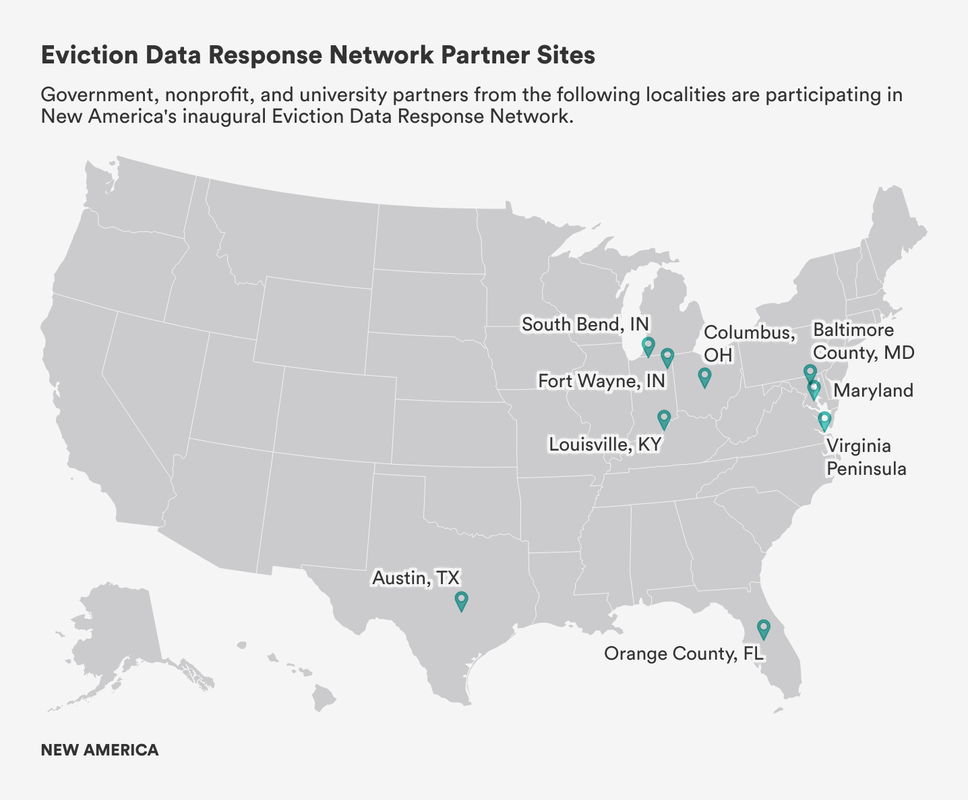
Source: Helen Bonnyman/New America
In late September 2025, FLH brought the EDRN teams together to learn from one another, share progress made over the last year, celebrate their accomplishments, and plan how to make this work sustainable. During the two-day event, first over powerpoints and sandwiches and then over tapas and drinks, a diverse and mission-driven cohort of housing, data, and policy leaders traded gripes, tips, tricks, and encouragement.
Our partners surfaced common challenges cleaning and interpreting court records, engaged national housing experts with questions and observations, and got into the weeds on data solutions. (Debates over the best dashboard software abounded.) And they commiserated over the shared challenge that, in an increasingly austere federal funding environment, limited resources for eviction prevention efforts make highly targeted and cost-effective interventions urgently necessary for meaningful impacts in community housing stability.
Our team was honored to hold space for these discussions, and to learn from and alongside the inaugural EDRN cohort. Below are some of our takeaways from the convening about the urgent challenges that eviction research and prevention practitioners face, and the value of gathering as a community to tackle them together.
More human resources for eviction data analysis are urgently needed as evictions approach or exceed pre-pandemic rates in many communities.
Eviction data work is complex enough that it requires dedicated human resources who can “own” it and be accountable for executing on it, in order to transition efforts from the ad hoc to a regular, sustained workstream. The creation of Maryland’s new Office of Landlord and Tenant Affairs, charged with stewarding data from the state’s courts, sets an example for other jurisdictions to follow. Convening attendees also heard from the City of Alexandria, Virginia, on hiring their own data analyst initially focused on evictions during the pandemic.
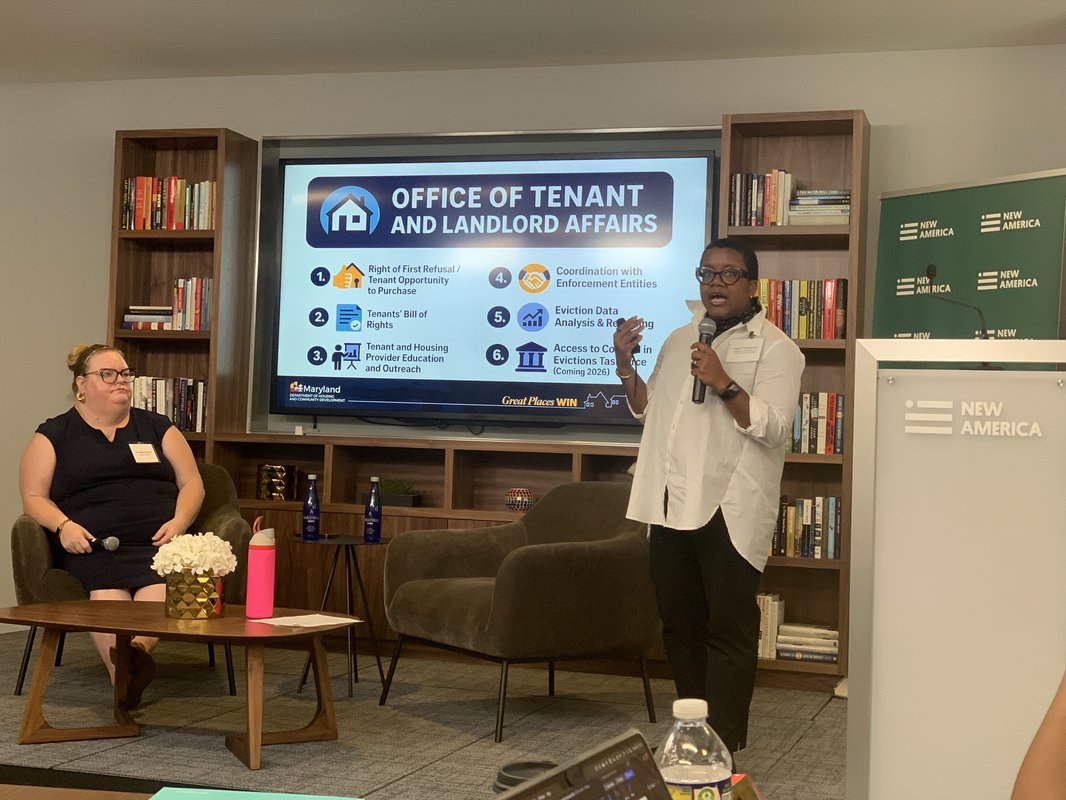
Danielle Meister, Assistant Secretary of Homeless Solutions for the state of Maryland (L) and Alyce Thompson, Director of the state’s new Office of Tenant and Landlord Affairs (R), outlined the Office’s roles.
Source: Emily Winchester/New America
The engagement of local and national experts reflects the urgency and importance of eviction data to the housing policy field.
Because there is usually no mandate or framework at the local, county, or state level to steward eviction data, the slow work of improving its collection and analysis is often thankless and undersupported. As our partners diligently make strides—big and small—towards this goal, it is a reflection of the importance of this work that national experts representing Eviction Lab, the Urban Institute, National League of Cities, Georgetown University Law Center, and January Advisors also convened to learn alongside them and help them work through data or analysis challenges. Several EDRN partners brought the heads of their departments or agencies to the convening to internally advocate for the importance of this work.
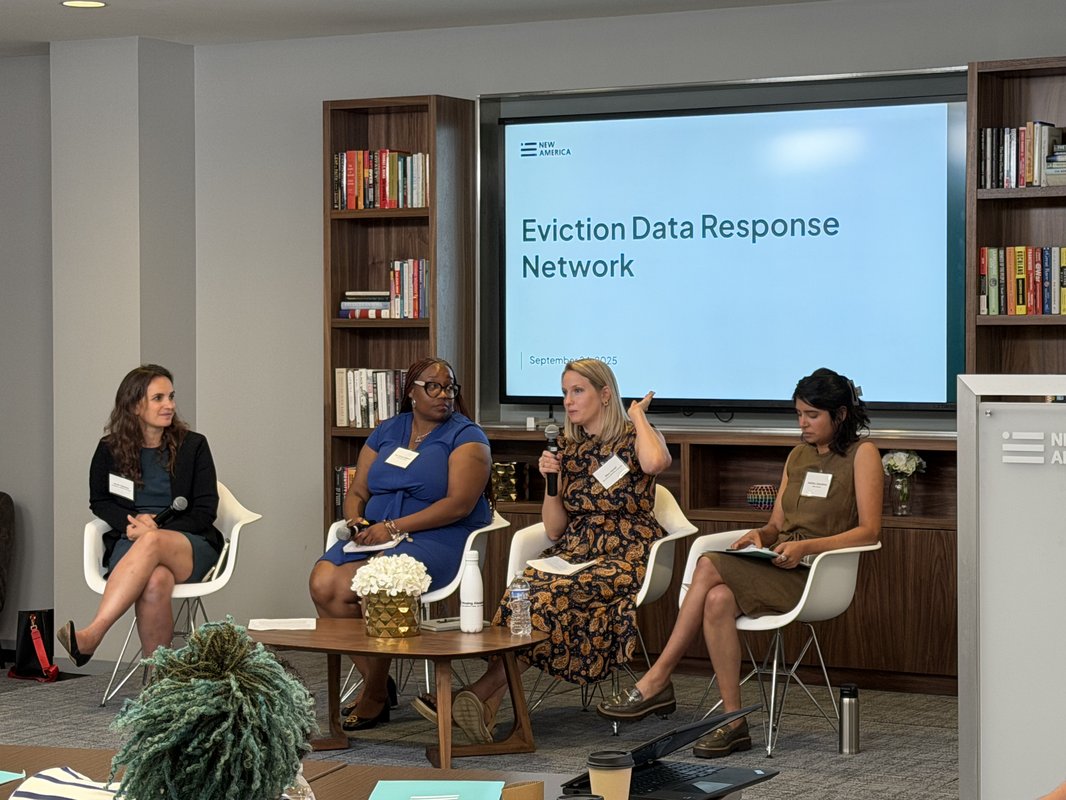
Nicole Summers, Georgetown Law Associate Professor; Delegate Nicole Williams, Maryland General Assembly; and Mary Horner, Landlord Tenant Division Chief for the City of Alexandria’s Office of Housing spoke with FLH’s Sabiha Zainulbhai on eviction data.
Source: Emily Winchester/New America
Strong communication is needed to bring data-based insights to life.
Public and philanthropic resources set aside for eviction prevention are critical, yet unfortunately insufficient for meeting the enormity of the eviction crisis. In advocating for additional funding, data to demonstrate the urgency of supporting eviction prevention is essential, but so is sharing that data in an accessible, actionable way. Eviction Lab’s Communication Specialist Camila Vallejo shared tips with attendees—“numbers mean nothing on their own,” and, conversely, “stories without numbers are just anecdotes”—to introduce a communications-focused exercise. Breakout groups crafted example deliverables communicating eviction statistics and a call to action, with messaging targeted for specific audiences like local government, state government, or philanthropy.
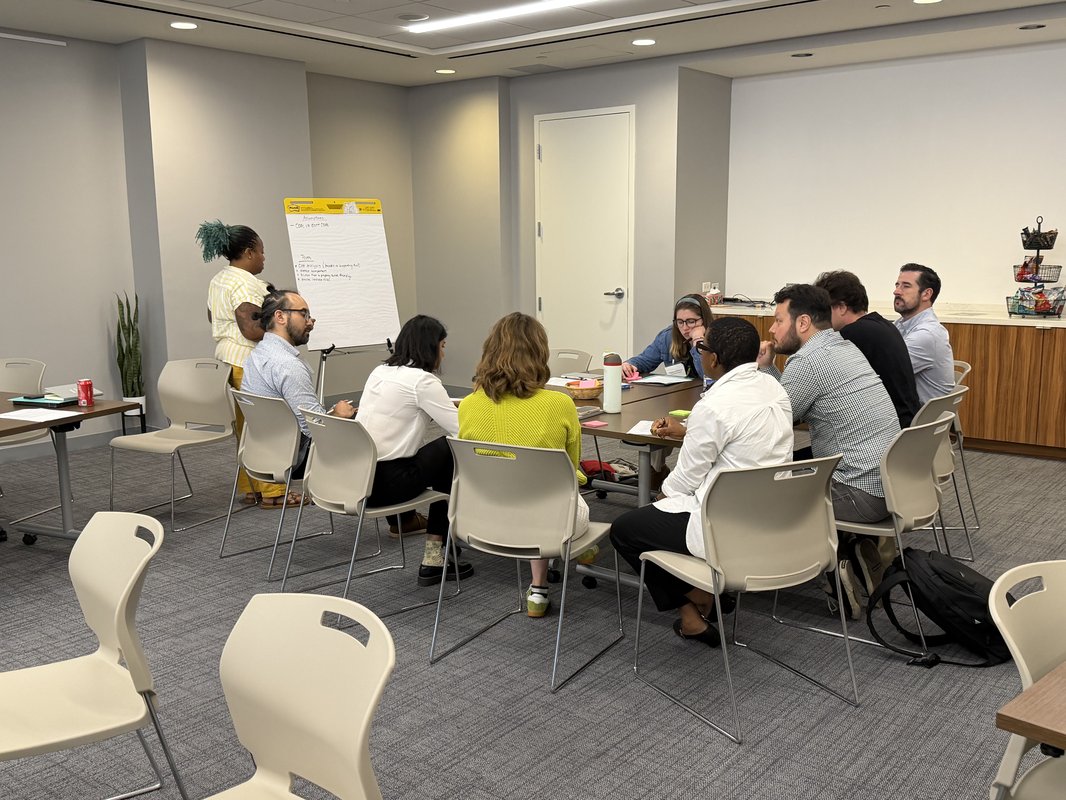
A breakout group plans messaging approaches for communicating about evictions to a state legislator.
Source: Emily Winchester/New America
Building community around eviction data work provides an essential boost.
Experts who gather and make sense of eviction data often feel like they’re the only ones in their community doing this difficult and important work. The in-person gathering felt like a powerful antidote to this sense of isolation, and it was gratifying to see teams exchanging contact information and making plans to stay in touch and support each other post-convening.
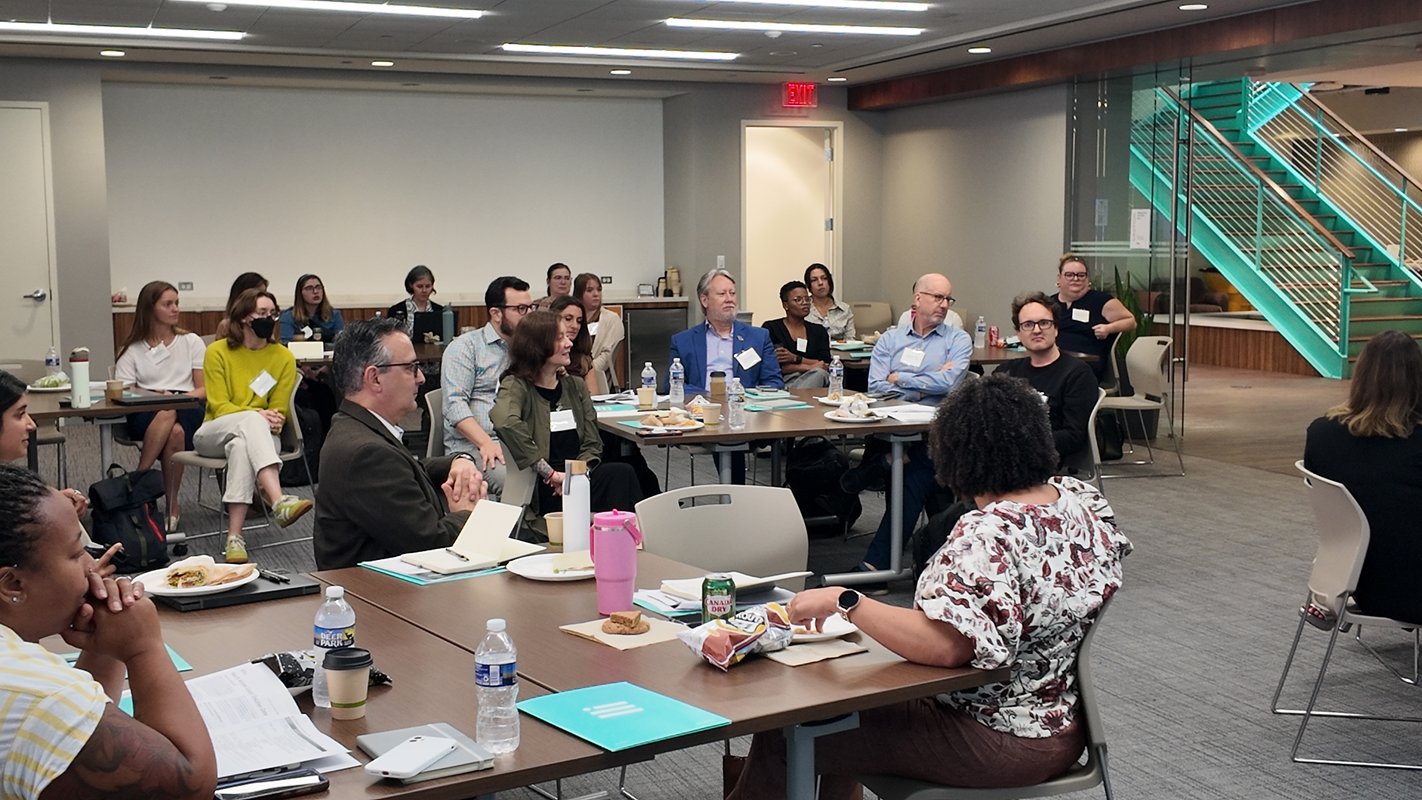
Attendees listen on as EDRN partner Traci Blue (Bright Community Trust) takes the mic.
Source: Trenton Cokley/New America
Many hands make light(er) work.
So many of the challenges that EDRN partners faced are not things that could be gleaned from the literature or anticipated in a vacuum. As complex and technical as analyzing eviction data can be, we found that it's people coming together and applying their problem-solving skills that moves the work forward the most, as we saw when partners presented their thorniest questions to the group and received actionable responses. The photo below offers a snapshot of the information shared among convening participants, but doesn’t quite capture how sharing ideas in real time sparked inspiration and understanding in a way no post-it or email ever could.
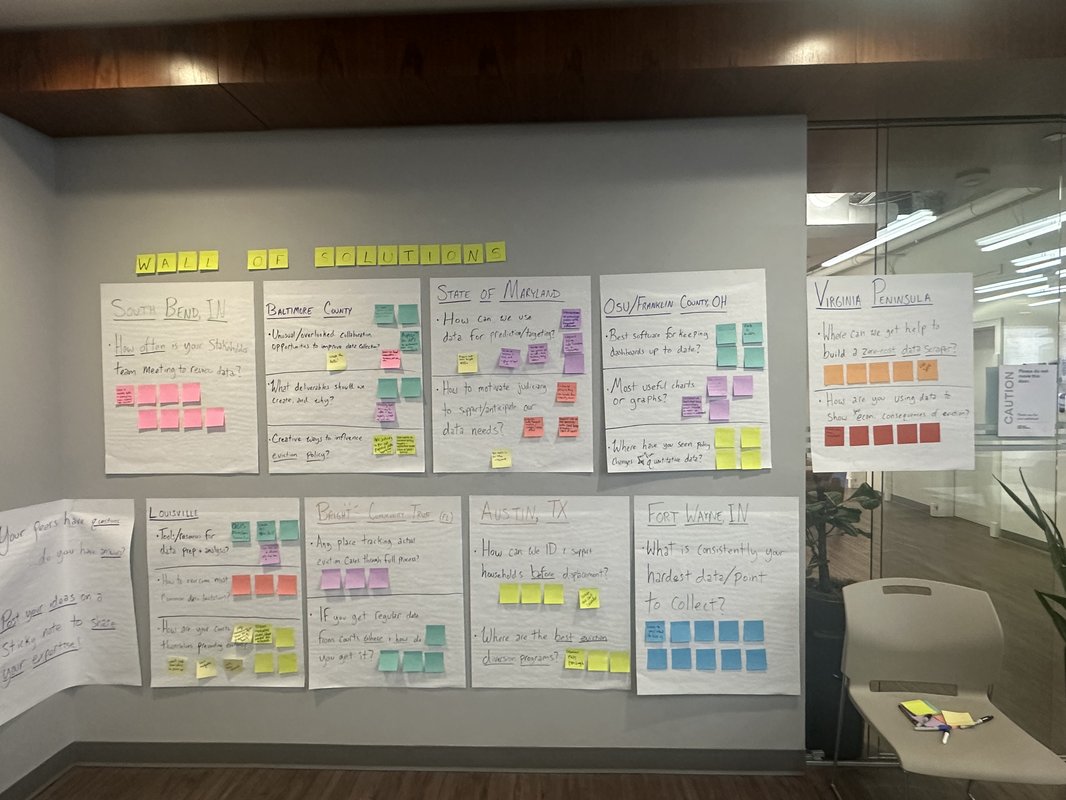
The questions EDRN partners asked their peers and experts in the room yielded some useful answers.
Source: Jake Maguire/New America
The EDRN in-person convening marked an important milestone for FLH’s work with our first cohort of partners. And our eviction data response work is only growing: Earlier in September, New America announced a $3.1 million grant from the Ballmer Group to scale EDRN statewide across 10 states over the next three years. Our EDRN work to date—primarily focused on the local level—will deeply inform this forthcoming state-level work. We at the Future of Land and Housing program cannot be more grateful for our partners, and look forward to continued collaboration with local- and state-level partners as this work continues.